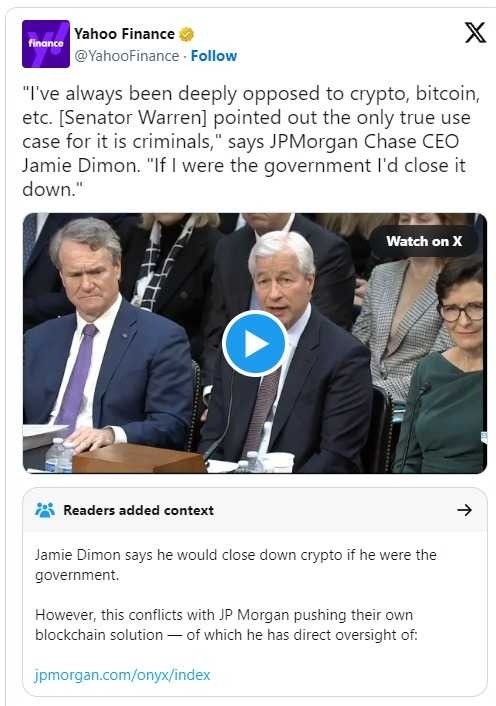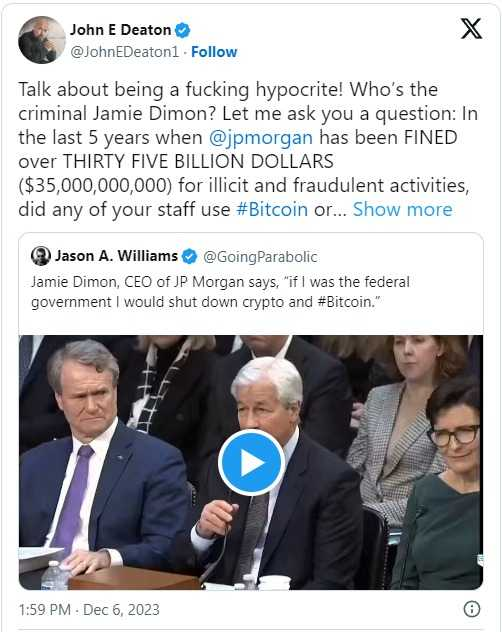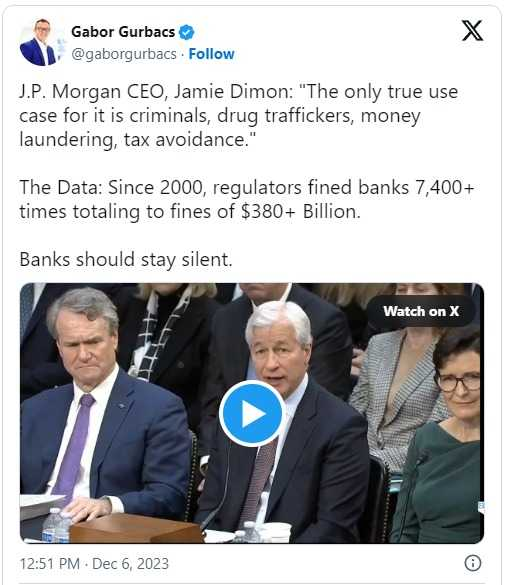The traditional finance (TradFi) sector, especially the banking institutions, is quite uncomfortable with cryptocurrencies and decentralized finance (DeFi) space. On many occasions, banks and executives were seen criticizing the emerging asset class for different reasons. Now JPMorgan CEO, Jamie Dimon, criticized the leading cryptocurrency Bitcoin (BTC) calling its use case only for criminal activities. The crypto community took the opinions and responded quickly calling out Dimon’s hypocrisy.
During a United States Banking Committee hearing on December 5, 2023, Dimon stated that Bitcoin has no true use case other than facilitating crime. He said that illicit people use it for criminal activities, drug trafficking, money laundering, and tax evasion. The executive advocated to shut down the cryptocurrency stating that, “If I were the government, I’d close it down.”
As soon as these comments surfaced over the social media platform X (formerly Twitter), the crypto proponents took no time to call out Dimon and the broader banking sector’s evil doings, violations of regulations, and paying hefty fines in return.
Pro-crypto lawyer, John Deaton, took to X and called Dimon a “fu**ing hypocrite.” He called out why his bank, JPMorgan Chase, has to pay a hefty fine of more than $35 Billion in the last five years. These fines came in the wake of a settlement for illicit and fraudulent activities and Deaton asked if any of these illicit activities involved Bitcoin (BTC).
VanEck strategy advisor Gabor Gurbacs in his long threads on X noted how banks and Jamie Dimon are “in no position to criticize Bitcoin.” He presented data that stated since 2000, the banks were fined by financial regulators in the United States more than 7,400 times. They paid a significant sum of more than $380 Billion in fines.
Crypto supporters dug down the past of JPMorgan to prove the hypocrisy shown in Dimon’s statements. The crypto community cited the data from the violation tracker of Good Jobs First highlighting that since 2000, the New York-headquartered bank had paid over $39 Billion in fines for more than 270 cases of violations.
This makes JPMorgan the second most penalized bank in the country. Moreover, a lion’s share of these fines, about $38 Billion, has been paid since Jamie Dimon took over as CEO in 2005.
Popular Incidents of JPMorgan’s Illicit Involvements
JPMorgan, led by CEO Jamie Dimon, recently settled for $75 million with the U.S. Virgin Islands in September over allegations of enabling and benefiting from Jeffrey Epstein’s sex trafficking operation between 2002 and 2005. It’s crucial to note that settlements do not imply an admission of guilt.
A decade ago, in October 2013, JPMorgan faced its largest fine ever, a hefty $13 Billion, for misleading investors about “toxic” mortgage deals, contributing to market collapses. Toxic investments are those significantly decreasing in value.
In September 2020, the bank resolved investigations into traders accused of manipulating metals futures markets between 2008 and 2016, agreeing to pay nearly $1 Billion.
Adding an unusual twist to its legal history, JPMorgan was connected to the largest cocaine bust in U.S. history. In July 2019, authorities seized 20 tons of cocaine, valued at $1.3 Billion, on a ship reportedly linked to a fund managed by the bank.
These legal challenges raise questions about JPMorgan’s internal controls and risk management practices. While settlements don’t confirm guilt, the recurrent nature of such incidents prompts scrutiny. The recent $75 Million settlement with the U.S. Virgin Islands underscores the seriousness of allegations related to the Epstein case, adding to the bank’s legal history.
JPMorgan’s ability to navigate these legal complexities and fortify its standing in the financial sector remains under close observation. As it addresses past controversies, the public and investors await indications of improved transparency and regulatory compliance.















 All while Pfizer—a company with a $2.3 billion criminal fine for fraudulent marketing, bribery, and kickbacks—was given blanket immunity from liability and billions in taxpayer dollars to produce a vaccine in record time with no long-term safety data.
All while Pfizer—a company with a $2.3 billion criminal fine for fraudulent marketing, bribery, and kickbacks—was given blanket immunity from liability and billions in taxpayer dollars to produce a vaccine in record time with no long-term safety data.
























